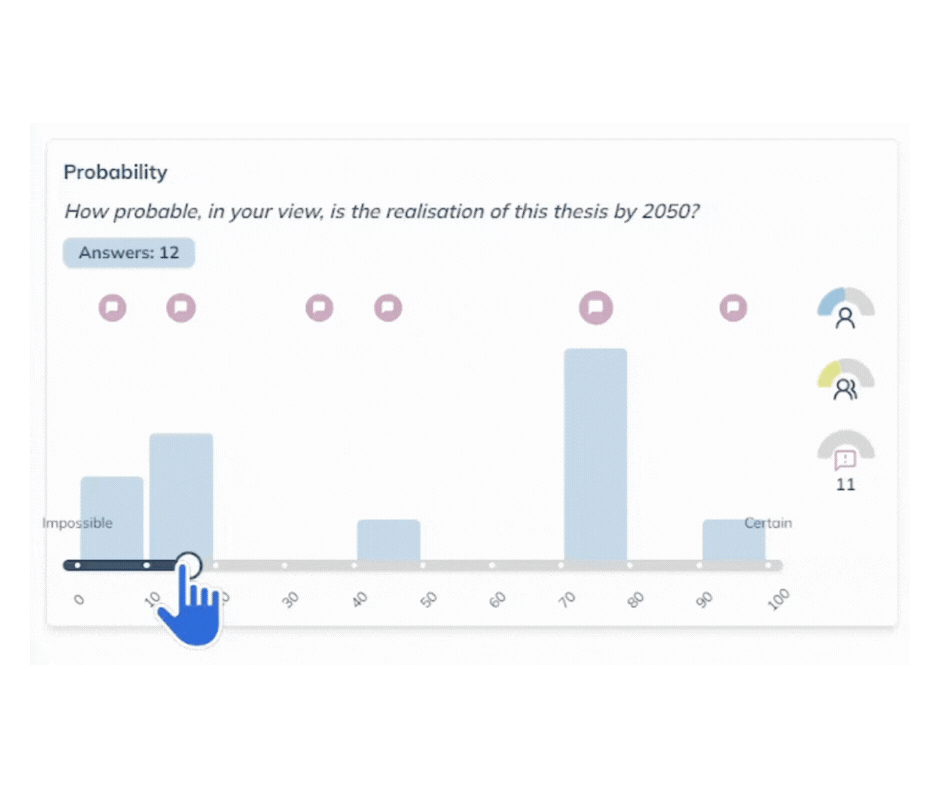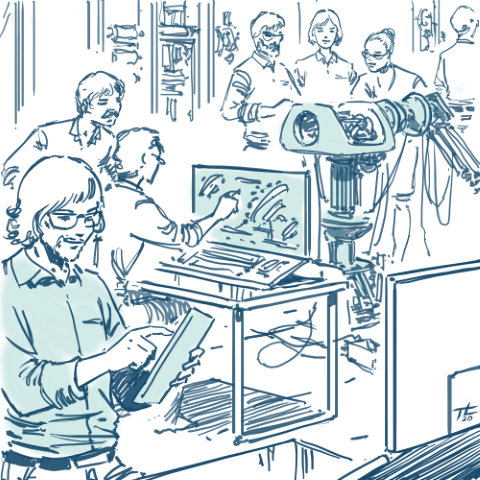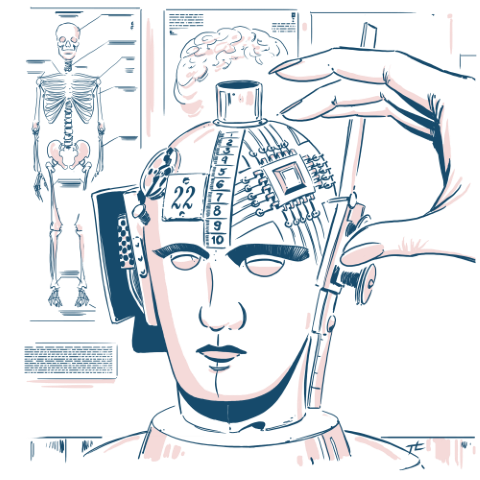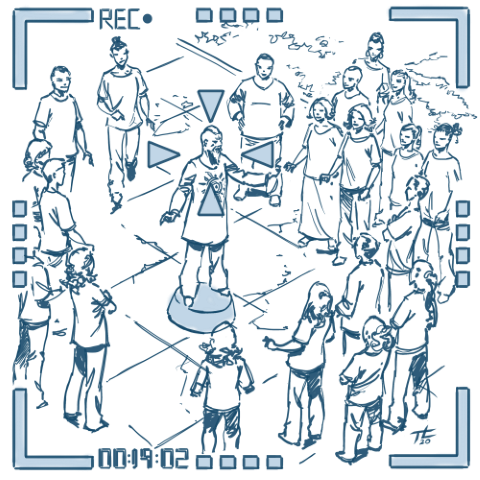Clear questions, deep insights
Best practices for Delphi thesis design in foresight and beyond

The foundation of insightful Delphi – the thesis
The Delphi method, with its structured approach to gathering and refining expert opinions, can be applied to a vast range of fields and questions – from setting standards for clinical trials, through shaping government policies, to informing military strategies. However, its roots lie in futures research, and it is within this domain and the realm of strategic foresight that it finds its most classic application. That’s why the Delphi “theses” we discuss in this article are specifically designed for exploring potential futures. While this is our focus, many of the best practices outlined here for crafting effective theses are transferable to other fields that utilize the Delphi method.
The Delphi method provides a powerful structure for harnessing collective intelligence, but the quality of the insights generated hinges directly on the quality of the statements participants assess. In Delphi, especially within futures research and strategic foresight, these often take the form of “theses” – descriptive statements about potential future states. Participants evaluate these theses (on likelihood, impact, desirability, etc.) and explain their reasoning. Crafting these theses effectively is perhaps the most critical design step. Just as a warp drive needs a stable dilithium crystal, a Delphi study needs well-crafted theses to reach its destination. Poorly formulated statements lead to ambiguous results, participant head-scratching, and unreliable insights. Well-crafted ones, however, unlock deep understanding.

What is a Delphi thesis?
Think of a Delphi thesis as a concise statement describing a certain aspect of a potential future or a specific hypothetical event within a defined timeframe. For example:
![]() Mandatory EQ certification revolutionizes smart devices: In 2050, mandatory emotional quotient (EQ) certification ensures all smart devices globally (from fridges and cars to intelligent tape dispensers) interact with users with sufficient empathy and politeness.
Mandatory EQ certification revolutionizes smart devices: In 2050, mandatory emotional quotient (EQ) certification ensures all smart devices globally (from fridges and cars to intelligent tape dispensers) interact with users with sufficient empathy and politeness.
![]() Trained pigeons transform last-mile deliveries: In 2050, vast networks of trained pigeon couriers form the primary system for instantaneous urban micro-deliveries in the EU.
Trained pigeons transform last-mile deliveries: In 2050, vast networks of trained pigeon couriers form the primary system for instantaneous urban micro-deliveries in the EU.
![]() Human comedy eclipsed by AI performers: In 2050, AI’s mastery of humor generation dominates global comedy.
Human comedy eclipsed by AI performers: In 2050, AI’s mastery of humor generation dominates global comedy.
Panelists assess this statement using predefined scales, such as:
![]() Probability/likelihood (How likely is it that pigeons will actually handle most deliveries by 2050?)
Probability/likelihood (How likely is it that pigeons will actually handle most deliveries by 2050?)
![]() Potential impact (If AI does take over comedy, what’s the impact on culture?)
Potential impact (If AI does take over comedy, what’s the impact on culture?)
![]() Desirability (Do we want empathetic tape dispensers?)
Desirability (Do we want empathetic tape dispensers?)
![]() Feasibility (Can we really seriously consider using pigeons for last-mile deliveries?)
Feasibility (Can we really seriously consider using pigeons for last-mile deliveries?)
Remember, the scores are only half the story; the real magic often lies in the justifications participants provide.

Why meticulous formulation matters
Throwing vague or messy theses at your expert panel leads to predictable problems:
![]() Participant confusion: If a thesis is unclear (“Will the future be… nice?”) experts will scratch their heads and won’t know what they’re actually assessing, leading to inconsistent interpretations.
Participant confusion: If a thesis is unclear (“Will the future be… nice?”) experts will scratch their heads and won’t know what they’re actually assessing, leading to inconsistent interpretations.
![]() Ambiguous results: If a thesis says “Pigeons deliver packages AND dominate the skies,” a ‘low likelihood’ score could mean disbelief in pigeon dominance, delivery efficiency, or both.
Ambiguous results: If a thesis says “Pigeons deliver packages AND dominate the skies,” a ‘low likelihood’ score could mean disbelief in pigeon dominance, delivery efficiency, or both.
![]() Justification nightmares: It’s hard to write a clear reason for agreeing or disagreeing with a statement that’s trying to do three things at once.
Justification nightmares: It’s hard to write a clear reason for agreeing or disagreeing with a statement that’s trying to do three things at once.
![]() Flawed analysis: Garbage in, garbage out. Aggregating responses to poorly defined theses produces statistically sound nonsense.
Flawed analysis: Garbage in, garbage out. Aggregating responses to poorly defined theses produces statistically sound nonsense.
Investing time upfront in careful formulation prevents these headaches and ensures valuable, interpretable insights.

Best practices for crafting effective Delphi theses
Here are key guidelines, illustrated with examples drawing inspiration from potential (and potentially peculiar) futures:
- Ensure clarity and conciseness: Use simple, direct language. Avoid buzzwords, jargon, or overly academic phrasing unless your panel consists entirely of people who love that sort of thing. Get straight to the point.
- Don’t: “The synergistic actualization of ubiquitous bio-integrated ambient networked illumination systems will fundamentally reconfigure nocturnal urban paradigms by 2050.” (Huh?)
- Do: “In 2050, genetically engineered bio-luminescent moss provides most public night lighting in cities worldwide.”
- Why: The world really doesn’t need more gobbledygook!
- Focus on a single, concrete phenomenon: Avoid compound statements and mini-scenarios – each thesis should tackle one core idea. Don’t bundle!
- Don’t: “In 2050, trained pigeons handle most urban deliveries, which dramatically changes city logistics and requires new anti-pigeon zoning laws.” (Combines prevalence, impact, and regulation).
- Do: Split it up or eliminate unnecessary parts of the thesis:
- Thesis A: “In 2050, trained pigeons perform the majority of last-mile urban deliveries.”
- Thesis B (to be removed if not essential for your survey’s goals): “In 2050, managing large pigeon courier flocks is a major urban planning challenge.”
- Why: Participants need to know exactly what they are rating. Compound statements can lead to confusion and misinterpretation, as participants may only focus on one aspect of the statement or fail to consider the probability of a conjunction. This will ultimately undermine the reliability and validity of the assessment results.
- Specify time horizon and context: Assessments need boundaries.
- Don’t: “In the future weather is pleasant”
- Do: Explicitly state timeframe (“In 2050…”) and scope (“globally,” “in major orbital tourist hotels”, “on long-term Martian colonies”). If the scope is global for all, state it clearly upfront.
- Why: Likelihood of regulated personal weather bubbles in 5 years vs. 300 years? Global or just California? Context is key.
- Strike a balance on specificity (the Goldilocks principle): Not too vague, not too specific, but just right.
- Don’t:
- Too vague: “Space travel will be boring” ; “Robots will be helpful”
- Too specific: “In 2050, low Earth orbit (LEO) hotel meals consist only of beige nutrient paste flavored faintly of chicken”; “In 2100, all Martian colonists communicate exclusively via clicks mimicking the Zorp-7 recycler unit”
- Do: Focus on the core phenomenon.
- Why: Too vague (“Robots will be helpful”) is meaningless. Too specific (“In 2100, all Martian colonists communicate exclusively via clicks mimicking the Zorp-7 recycler unit”) might cause rejection based on an irrelevant detail (the specific unit), even if the core idea (habitat noises influencing language) is plausible.
- Don’t:
- If possible, use present tense: Phrasing as if it’s happening in the target year (“In 2050, personal weather bubbles are common…”) makes the future feel more tangible.
- Why: Aids imagination, clarifies the state being assessed.
- Ensure assessability: Can experts reasonably judge your thesis based on their knowledge and the scales provided?
- Why: Need meaningful data. Even zero-g swimming can be assessed for technical feasibility or potential audience appeal by relevant experts.
- If you’re doing futures research, make it truly future-oriented: For valuable insights, make sure that many of your theses describe assumption-challenging, non-obvious, eye-opening future states, not the present, nor the “mainstream futures”, nor simple linear continuations.
- Why: Foresight is about exploring potentially surprising changes and disruptions, it’s about realising previously unknown possibilities and challenges.
- Include titles/short names: A short title (“Pigeon Couriers,” “Pet Contracts”) drastically improves navigation, especially in RTD platforms.
- Why: Navigating easily and freely is an essential usability feature in modern Delphi surveys, allowing participants to focus their attention where it’s most needed, especially on revisits in Real-Time Delphi.

The value of pilot testing and expert input
Given how tricky formulation can be, always pilot test your draft theses. Use a small sample group to check for clarity, ambiguity, and interpretation issues. Use their feedback to refine the theses before formal rating begins.

How modern platforms help
Thoughtful thesis formulation is key, but good platforms support it by:
![]() Ensuring clarity and context: Good platforms present the thesis title, full text, specific assessment scales and the justifications clearly minimizing cognitive load and preventing participants from losing track. Modern user interface design makes this presentation seamless and intuitive.
Ensuring clarity and context: Good platforms present the thesis title, full text, specific assessment scales and the justifications clearly minimizing cognitive load and preventing participants from losing track. Modern user interface design makes this presentation seamless and intuitive.
![]() Facilitating deeper reflection through flexible navigation: Easy navigation, often enabled by clear thesis titles and well-structured platform layouts, is more than just a convenience. It allows participants to effortlessly jump between related theses, compare their own assessments across different statements, and easily revisit specific points based on insights gained elsewhere or from reading others’ comments (especially in RTD). This supports a more interconnected, non-linear, and reflective thought process crucial for grappling with complex future topics.
Facilitating deeper reflection through flexible navigation: Easy navigation, often enabled by clear thesis titles and well-structured platform layouts, is more than just a convenience. It allows participants to effortlessly jump between related theses, compare their own assessments across different statements, and easily revisit specific points based on insights gained elsewhere or from reading others’ comments (especially in RTD). This supports a more interconnected, non-linear, and reflective thought process crucial for grappling with complex future topics.
![]() Enhancing focus via user experience: A clean, uncluttered, and responsive interface helps participants concentrate on the substance of the thesis and formulating their justification, rather than struggling with the tool itself. Platforms focused on excellent UX, like 4CF Halnyx 2.0, ensure that all theses receive the careful consideration they deserve, without adding unnecessary frustration.
Enhancing focus via user experience: A clean, uncluttered, and responsive interface helps participants concentrate on the substance of the thesis and formulating their justification, rather than struggling with the tool itself. Platforms focused on excellent UX, like 4CF Halnyx 2.0, ensure that all theses receive the careful consideration they deserve, without adding unnecessary frustration.

Clarity in questions yields clarity in insight
Crafting effective Delphi theses requires marrying methodological rigor with clarity and imagination. It demands precision, focus, awareness of scope, and anticipating participant interpretation. Investing time in formulation and testing is the prerequisite for a successful study that yields reliable, deep insights rather than confused shrugs. Well-defined theses, presented effectively on a user-friendly and capable platform, form the bedrock upon which deep collective insights are built.

Experience the next generation of Delphi
4CF Halnyx 2.0 provides the intuitive, powerful, and insight-focused platform needed to conduct effective Real-Time Delphi studies that deliver meaningful results.
Interested in Delphi and RTD? Explore our expert series:
4CF Delphi Expert Series offers comprehensive insights, drawing on extensive experience, covering everything from the fundamentals to advanced applications and the crucial role of next-generation platforms. Whether you're new to Delphi or an experienced practitioner, explore these articles to deepen your knowledge and enhance your results.






Explored these? Discover even more in our full Delphi series
Interested in Delphi and RTD? Explore our expert series:
4CF Delphi Expert Series offers comprehensive insights, drawing on extensive experience, covering everything from the fundamentals to advanced applications and the crucial role of next-generation platforms. Whether you're new to Delphi or an experienced practitioner, explore these articles to deepen your knowledge and enhance your results.
Explored these? Discover even more in our full Delphi series
Stay updated! Subscribe to our newsletter:
By subscribing to our newsletter, you consent to the processing of the provided data. The data controller is 4CF Sp. z o.o., its registered office is located in Warsaw, 10/14 Trzech Krzyży Square, postal code: 00-499.
We process your data solely for the purpose of sending information about 4CF Sp. z o.o. and its activities via e-mail. Your data will be processed until your consent is revoked through a link that will be included in each newsletter. The withdrawal of consent shall not affect the lawfulness of processing based on consent before its withdrawal. Providing your data is voluntary, but necessary if you wish to receive information about 4CF Sp. z o.o. and its activities. We may transfer the data to our suppliers of services related to the processing of personal data, e.g. IT service providers. Such entities process data on the basis of a contract with our company and only in accordance with our instructions. You have the right to request access to your personal data, its rectification, deletion or limitation of processing, as well as the right to lodge a complaint with the supervisory authority. More information about your rights and about the processing of your personal data can be found in our privacy policy.







